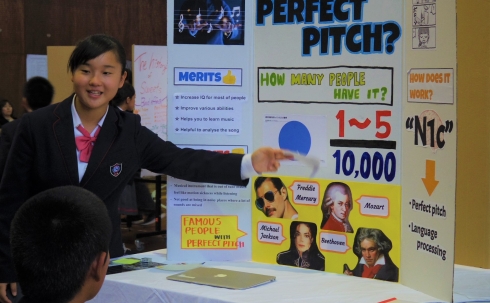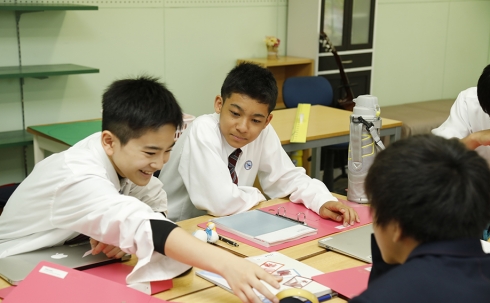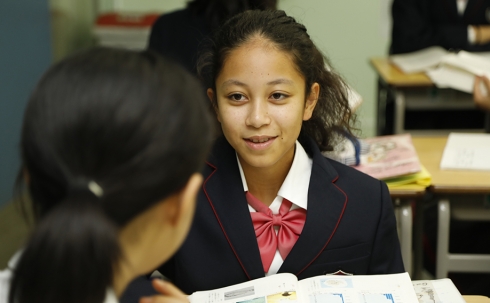Junior High School
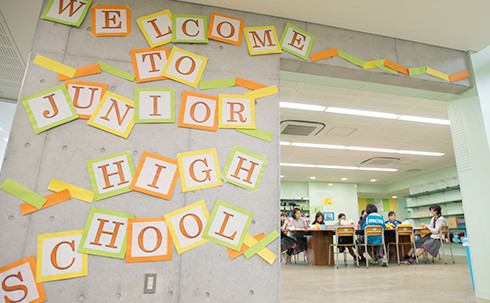
Towards the Independent Stage
Students develop a higher level of autonomy as they form various student bodies such as student council and sub-committees. They discover their potential through personal research activities and projects. Students start forming goals for their future as they prepare for higher education.
Learning Emphasizing OUTPUT
In the classes of each subject in Junior High School, our students are asked to build up their knowledge through collaborative studies and to logically compile and present their own opinions in the report assignments, discussions and debates. Throughout the ninth grade (senior year in Junior High School), students engage in “individual project,” where they set up their own themes, conduct surveys/research, and make presentations. Combining such “Dispatching” ability developed in this project with “Language fluency” which is accumulated throughout the elementary school years, will be the driving force to launch the students into the internationalized society.
High Level of Self-Governance
Supporting the Voyage
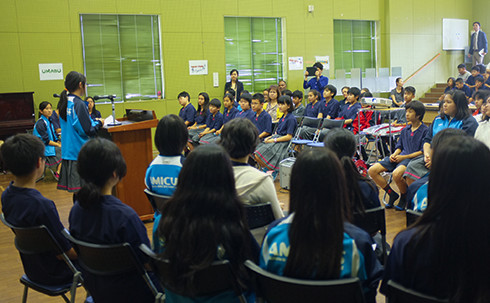
In junior high school, students begin to engage and play a central role in high level of self-governance through the “Student Council / Sub Committees.” Students themselves think out the ideas for improving the school, and by planning and executing the activities they gain the skill to live autonomously in the society. The executive members are elected by democratic election and they begin to gain the capacity to act as leaders through training activities such as leadership training. Since such activities are conducted beyond the borders of the courses and grades, students can deepen the exchange among the students from other grades and courses.
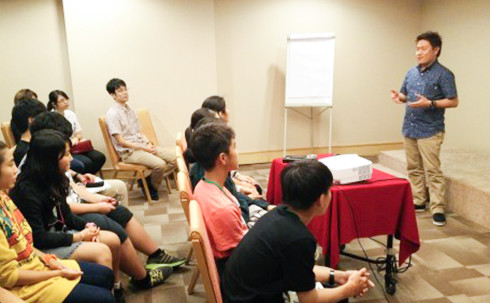
AMICUS does not have a high school. To assist our students to venture out from AMICUS to each of their future endeavors, we support them to find and take the first step towards each of their dreams. Through attending career study sessions, lectures and classroom activities, students can listen in the stories of successful people from various fields, talk about their dreams with one another, and prepare for their future journeys. For students advancing to Japanese senior high schools, we provide supplementary mathematics and science classes that are taught in Japanese once a week .
Characteristics of Subjects
Japanese
We conduct project-based exploratory learning, utilizing not only textbooks, but also reference books and ICT. We develop the students’ qualities and abilities to understand accurately and express properly in Japanese by selecting accurate information from research and sharing it in groups to deepen the learning. Students compile their own opinions and present them based on their own perspectives and critical ideas. They also develop the ability to respect and accept opinions of others and learn how to approach different opinions. In addition, we utilize the content learned in each unit to develop the qualities and abilities to effectively transmit Japan’s unique culture/customs, and ideas overseas.
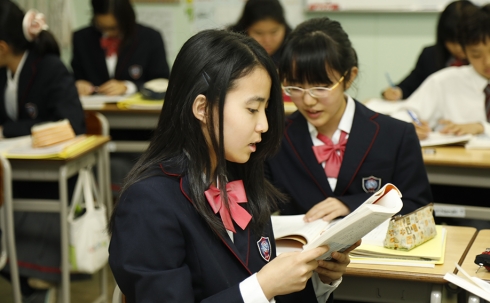
Math
We develop lessons that match the students’ proficiency by dividing them into advanced class and basic class.
In basic class, we aim to acquire the textbook content with certainty, and in the advanced class, we aim to further develop mathematical skills by incorporating advanced problems such as entrance examination questions.
Students also read and research articles on quantitative data, and use iMovie to create instructional videos of math problems to develop skills to explain math concepts in English.
We also provide supplemental lessons in Japanese.
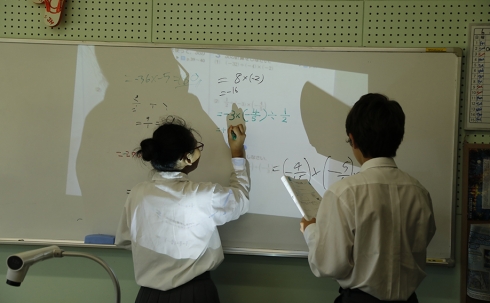
Science
Through exploratory learning activities, students will be willing to be involved in science, and they will develop the ability to deepen their understanding of exploring natural phenomena.
Each student and group will develop a project-based lesson that identifies issues, formulates hypotheses, finds ways to investigate and find resolutions, and collects/analyzes data.
In science, supplementary lessons in Japanese are also offered.
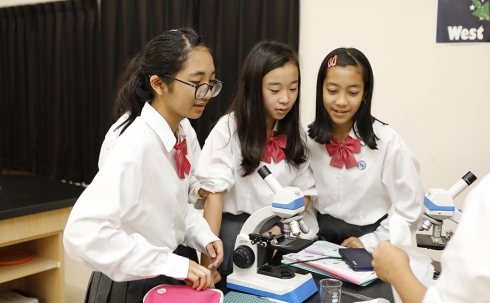
Social Studies
In grade seven, students study geography in English. While learning the contents of textbooks, we actively introduce presentations and develop the ability to communicate what we have learned in English.
The eighth and ninth graders study historical and civil fields in Japanese. To foster a social perspective and way of thinking, we explore the history/society of the world, Japan and Okinawa in a deeper and a more global angle based on the contents of textbooks.
In the second half of ninth grade, students will study according to their career path after graduation. They will be divided into courses such as, entrance examination preparation(basic/advanced), according to their proficiency level, and report preparation guidance in English and Japanese.
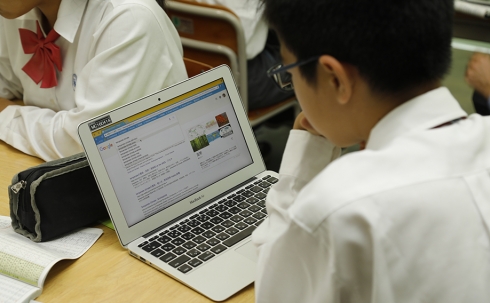
English
Through the linguistic activities of listening, reading, speaking, and writing, various groups are formed by students’ proficiency levels and class levels; aiming to foster a high-level English proficiency that enables students to study in a learning environment in English-speaking countries.
We teach correct grammar, vocabulary, basic sentence structure, and we also develop students’ ability to read, understand, and write more deeply based on their interests; ultimately helping students find and learn more about themselves by nurturing their qualities and abilities to convey what they have learned.
In addition, students will learn the contents of the curriculum guidelines in “MEXT English” classes and acquire basic grammar.
Furthermore, we conduct TOEFL Junior to improve students’ English proficiency.

ICT in Education
Towards Glocal Digital Citizens
At Amicus, we aim at fostering an appropriate attitude to participate in the information society.
Students are familiarized with Digital Ethics within moral education classes and whenever using technology or digital information sources such as search engines, online encyclopaedia, newspapers, etc.:
- Lectures and discussions on positive and negative aspects of daily technology
- Cross-curricular development of critical thinking and media & information literacy (validity and quality of information, opinions vs. facts…)
- Netiquette (basic rules of conduct) and legal issues (material licenses, cyber-bullying…)
Through various projects, students are encouraged to become active producers of information, art and technology:
- Writing and sharing (essays, reports, blogs, reviews, presentations…);
- Audio-visual production (instructional videos, creative short movies, podcasts…);
- Software and hardware design (video games, robots, electronic devices…).
In junior high school, each student has an iPad, which provides a learning environment for independent use in various subjects and activities. By using it everyday, students develop their creativity and acquire ICT skills needed for the new era, obtain information from the internet to use for learning, and create reports, presentations, videos, etc… In addition, students share their ideas in real time, enabling them to exchange opinions and deepen their independent/collaborative learning.
Students learn how to take care of their personal equipment, choose the necessary solutions to various bugs and technical problems, share their work, and also learn how to secure and respect digital identity.
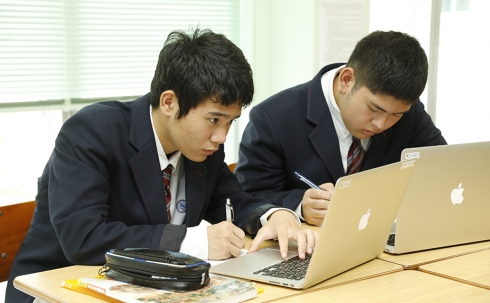
Education in Library
The Media Center (Library) is located in the center of the school building. Children walk through the library to go to each classroom every morning. Since they have many opportunities to go through this hub, the library becomes a welcoming place for the students.
A special feature of the AMICUS library is its volume of foreign books. As of 2016 School Year, the total is 11,000 books (6,300 Japanese books and 4,700 foreign books). Our foreign teachers help to select books which are worth reading and appropriate for the children. There are collections in English and Japanese for popular books, such as “Harry Potter”, or picture books. Therefore, the children can enjoy reading books in a unique AMICUS’ way, by reading one book in Japanese and try to read the same book in English or vice versa.
For the children who spend a long time of their lives in AMICUS, from Kindergarten to Junior High School, the media center is also a place to relax and socialize. We try to utilize the facility to fulfill children’s intellectual curiosity and watch over their growth through their reading experiences.
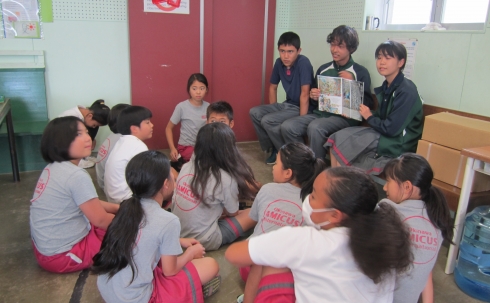
In junior high school, students will have the opportunity to use library books as materials to help their assignments. They will also have more chances to read English books through English classes. Junior high students also have exchanges between different grades. Reading the books that they made to kindergarten children makes the best use of the advantages of Amicus being a school integrating kindergarten, elementary and junior high school.
Events
April
Entrance Ceremony
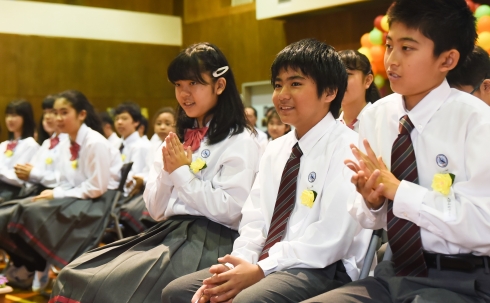
May
Overnight Trip
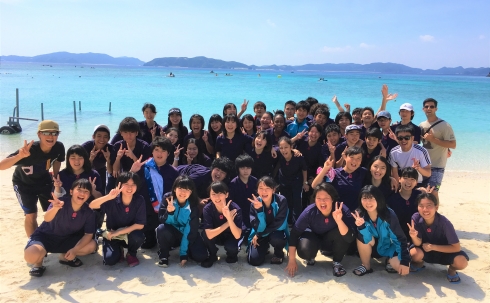
June
Peace Assembly

July
Career Fair (G7)
Performance Day
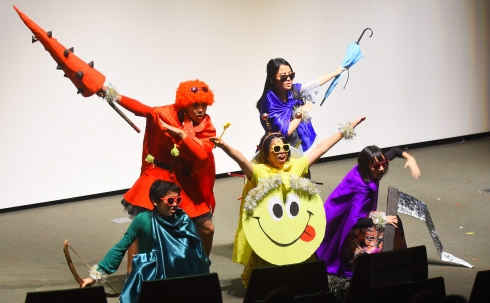
August
High School Information Session
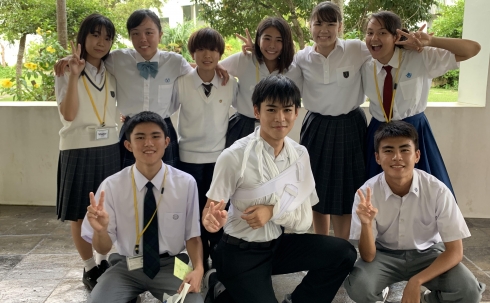
September
Nakagami District Track & Field Competition
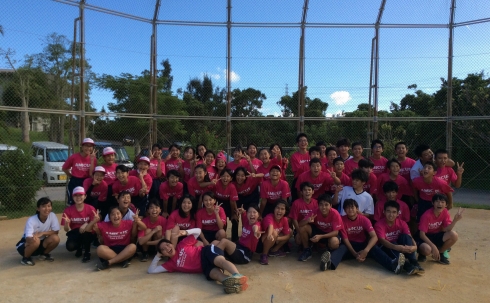
October
Choir Competition
JH Olympic (Sports Day)
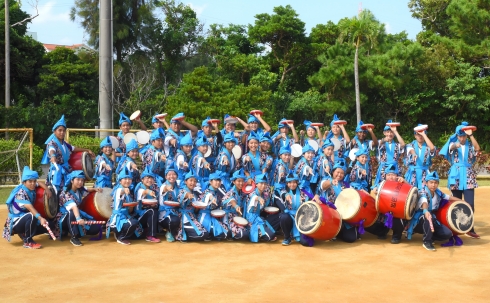
November
Career Experience (G8)
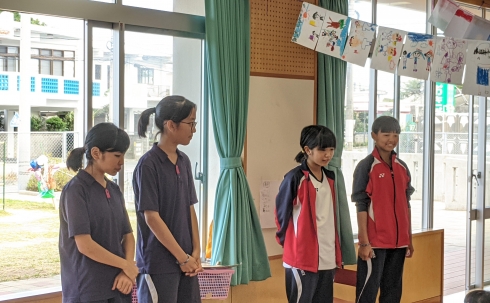
December
Personal Project Session (G9)
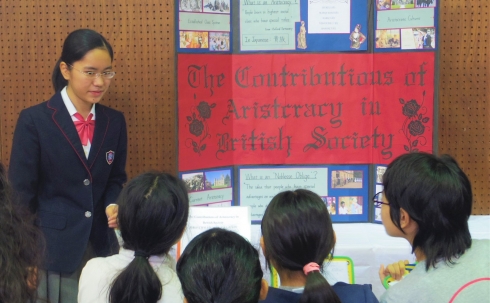
January
School Trip (G8)
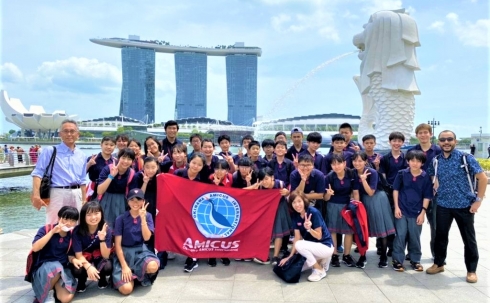
March
Graduation ceremony
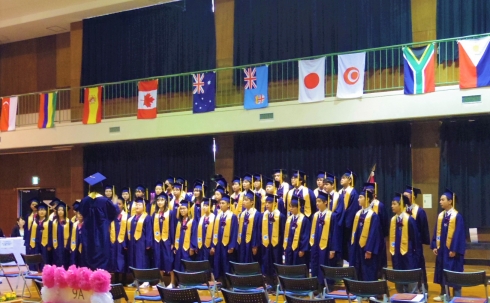
Other
Marine Sports Field Trip
Student Council Event
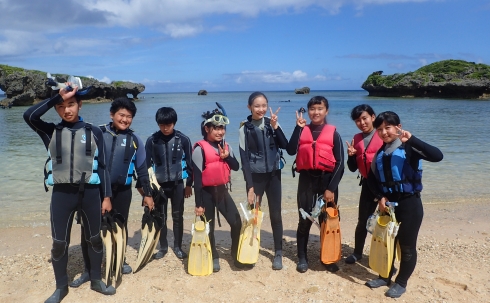
Daily Schedule (JHS)
| 8:15~8:30 | Arrival / Morning work |
| 8:30~8:55 | Short time learning / Homeroom |
| 8:55~10:40 | 1st and 2nd periods |
| 10:40~10:50 | Presentation / Transition |
| 10:50~12:35 | 3rd and 4th periods |
| 12:35~13:40 | Lunch / Recess /Cleaning |
| 13:40~15:25 | 5th and 6th periods |
| 15:25~15:35 | Homeroom |
| 15:35 | Dismissal |


